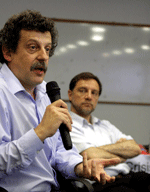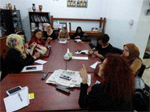Published on Tue, 2014-10-07 10:27
The Spanish policy of international development cooperation is showing symptoms of exhaustion, says Plataforma 2015, the Spanish chapter of Social Watch, The crisis in Spanish cooperation policy affects the most vulnerable people and evidences a collective failure in respecting and protecting human rights. These are problems of ethical and political nature and Spanish cooperation needs a reform consistent with the need for a global governance centered on guaranteeing the rights of all people of the world. |
Published on Fri, 2014-10-03 10:53
In a letter to U.S. and EU trade negotiators and finance ministers, 52 civil society groups on both sides of the Atlantic, Global Policy Forum amongst them, have come together to warn that the Transatlantic Trade and Investment Partnership (TTIP) currently under discussion could undermine new financial regulations and potentially create significant risks to the global financial system, as well as to investors and consumers. Despite the experience of the global financial crisis, leaked documents from the confidential TTIP negotiations indicate that current TTIP drafts replicate deregulatory provisions from pre-crisis trade arrangements, in some cases even adding new loopholes, such as the suggestion to introduce investor state dispute settlement provisions. |
Published on Thu, 2014-10-02 19:23
Roberto Bissio is the coordinator of Social Watch, an international network of citizens’ organisations reporting on how governments and international organisations implement their commitments on poverty eradication and gender equality. Here, he talks to Equal Times about this crucial moment in the development world. |
Published on Thu, 2014-10-02 09:36
Last week, the Human Rights Council adopted a resolution condemning the activities of vulture funds for their impacts on the capacity of governments to fulfill their human rights obligations. In a resolution passed with 33 of the votes of members, only 5 countries voting against (United States, Germany, Japan, UK and Czech Republic) and 9 abstentions, the Council held that debt repayment to the aforementioned funds, under predatory abusive conditions, bears a direct negative effect on human rights. |
Published on Thu, 2014-09-25 13:35
The new government of Iraq, announced last September 8 by the new Prime Minister Haider al Abadi was resented by the major organizations of Iraqi women because it includes only one woman among its 25 members (22 ministers and three deputy Pms). The Iraqi Women Network expects more women in decision-making positions, as promised by politicians. “It is unfortunate, says IWN that women remain victims of patriarchal bargains in the distribution of ministerial positions and the consolidation of the policy of exclusion and discrimination against women”. The women activists agreed to continue demanding to increase the share of women in the ministries that still have not appointed ministers, as well as deputy ministers within the cabinet, in the chairmanship of the parliamentary committees and in the presidencies of the independent commissions and boards. |
SUSCRIBE TO OUR NEWSLETTER







